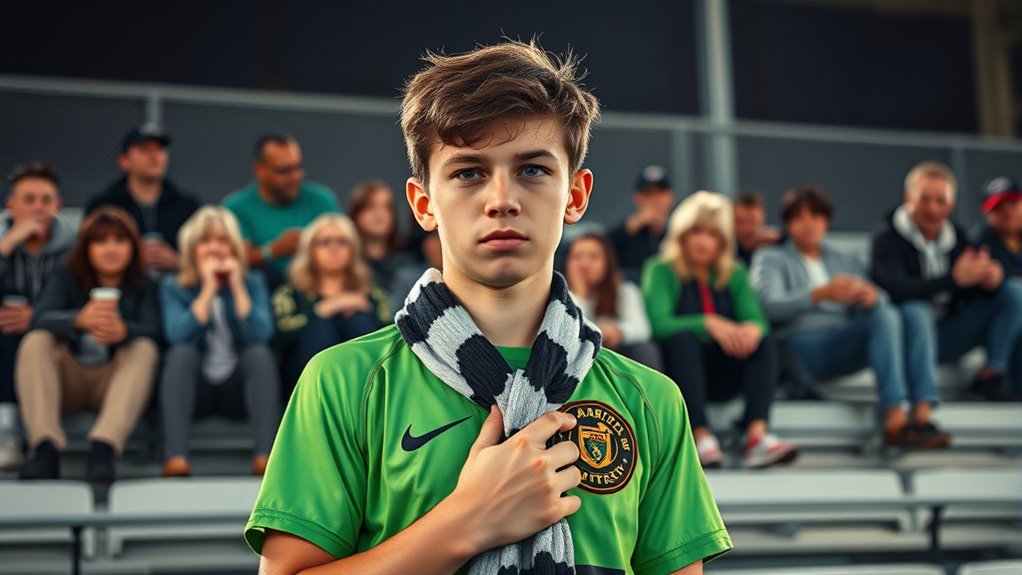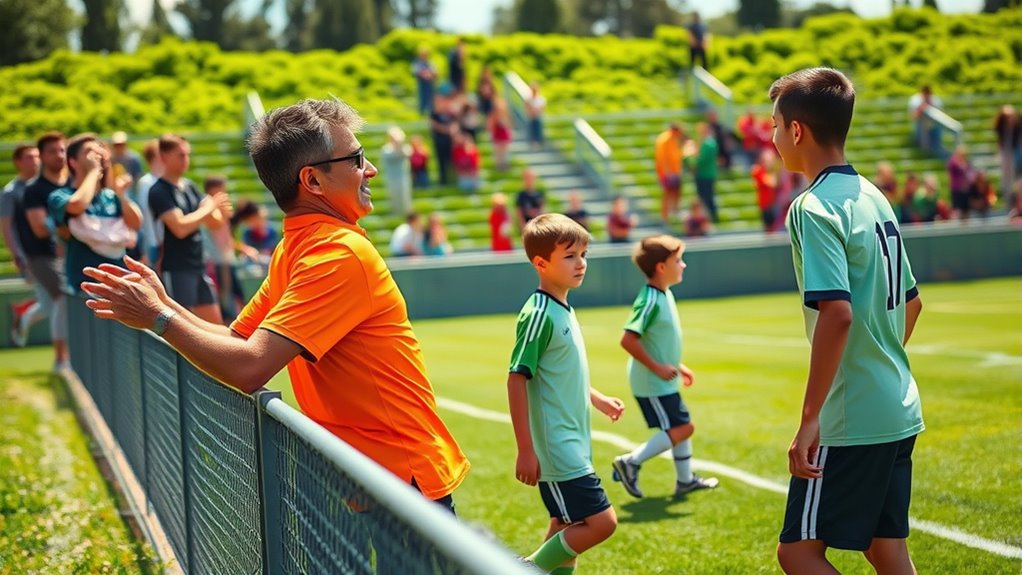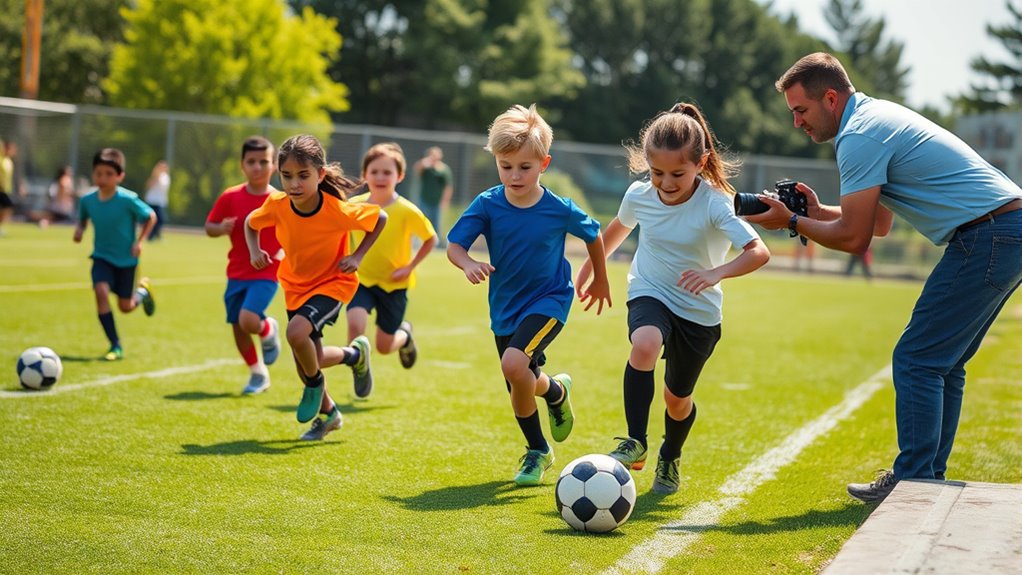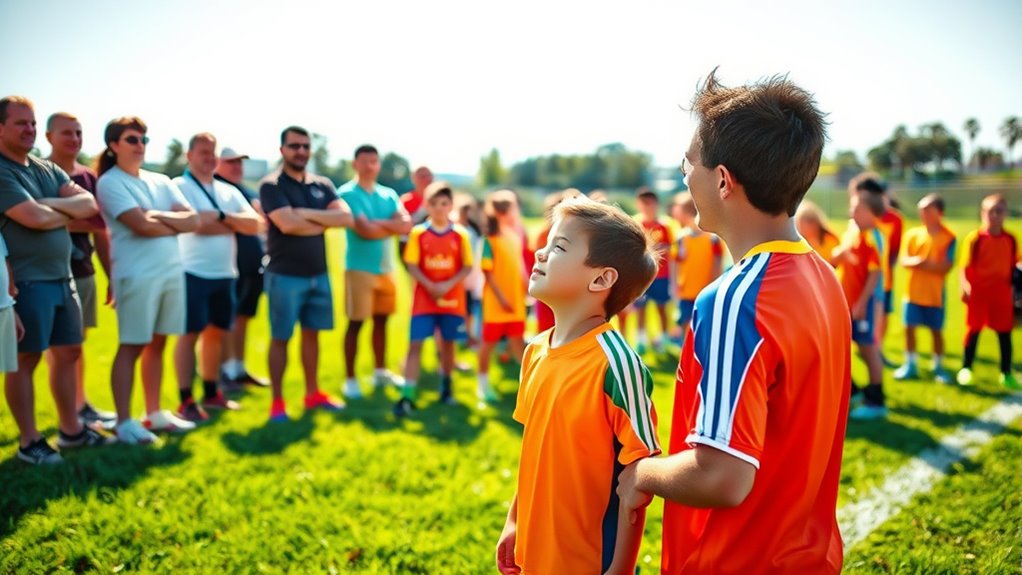Your influence as a parent shapes your child’s loyalty to their team through modeling support, enthusiasm, and setting clear expectations. When you actively encourage effort, celebrate progress, and create traditions, you foster a strong sense of belonging and commitment. Your encouragement and involvement help your child develop trust and attachment to the team. Understanding these strategies can help you strengthen enduring loyalty—if you’d like to discover more, keep exploring these key insights.
Key Takeaways
- Parental modeling and enthusiastic support foster positive attitudes and deepen youth loyalty to their teams.
- Consistent parental encouragement and recognition of effort promote long-term commitment and a sense of belonging.
- Sharing family traditions and engaging in team activities strengthen emotional bonds and reinforce loyalty.
- Parental responses to peer rivalry and team dynamics influence children’s confidence and attachment to the team.
- Open communication and balanced expectations prevent burnout, maintaining intrinsic motivation and genuine team loyalty.
The Role of Parental Modeling in Team Affiliation

Parental modeling markedly influences how youth develop their team loyalties. When you demonstrate strong parental authority and show enthusiasm for specific teams, your child is more likely to adopt similar loyalties. Children often look to their parents as role models, mimicking their attitudes and behaviors toward sports and teams. If you prioritize team spirit and support, your child may feel encouraged to develop lasting loyalty. Peer influence also plays a role, but your consistent attitudes set the foundation. When you openly express your team preferences and display positive engagement, you guide your child’s perceptions and choices. Ultimately, your behavior shapes how they view team loyalty, making your influence a critical factor in their sports affiliations. Regularly engaging in targeted communication with your child about sports can further strengthen their sense of loyalty and involvement.
Impact of Parental Encouragement and Support

When your encouragement and support are present, they can considerably boost a young athlete’s loyalty to their team. Your active involvement shows them that their efforts matter, fostering a stronger commitment. This support helps shape their long-term dedication and sense of belonging. Additionally, understanding the importance of color accuracy in visual presentation can mirror how precise feedback and encouragement can positively influence their motivation.
Parental Role Modeling
Parents serve as influential role models by actively demonstrating enthusiasm and commitment to their children’s sports interests. Your behavior can shape how your child perceives team loyalty. Consider these points:
- Show genuine excitement during games and practices to reinforce positive attitudes.
- Limit media exposure that might promote rival teams or negative sports culture.
- Model respectful interactions with coaches and teammates, emphasizing good sportsmanship.
- Be aware of peer influence, guiding your child to focus on personal growth rather than peer pressure.
- Encourage your child to develop a positive sporting attitude that emphasizes teamwork, effort, and enjoyment over winning at all costs.
Encouragement Boosts Loyalty
Your active encouragement can considerably strengthen your child’s loyalty to their team. When you openly support their efforts, you reinforce their sense of belonging and confidence. Parental authority plays a key role—by showing genuine interest and praising their progress, you help them value the team experience. Additionally, your support can help deflate sibling rivalry, which might otherwise create competition or resentment that undermines loyalty. When you celebrate your child’s achievements and encourage teamwork, you foster a positive environment that motivates them to remain committed. Your involvement signals that their efforts are valued, making it more likely they’ll develop a deep, lasting attachment to their team. Furthermore, understanding electric power generation with bike generators can serve as a metaphor for how consistent parental support consistently energizes and sustains a child’s commitment. Ultimately, your encouragement nurtures their dedication and helps build a lifelong loyalty to the sport.
Support Shapes Commitment
Consistent parental encouragement and support are essential in shaping a child’s commitment to their team. Your involvement can boost individual motivation and reduce negative peer pressure. Here are four ways your support makes a difference:
- Reinforces confidence, helping players resist peer pressure to quit or switch teams.
- Creates a safe environment where kids feel valued beyond winning or losing.
- Encourages perseverance, making commitment to the team more meaningful.
- Strengthens the child’s intrinsic motivation to improve and stay loyal.
- Understanding team dynamics can help parents better support their child’s sports experience.
Cultural and Community Influences on Loyalty Formation

Your cultural background and community connections play a key role in shaping youth loyalty to teams. Family traditions and shared values often influence which teams young people support. Additionally, community engagement practices and cultural identity can strengthen a sense of belonging and commitment. Understanding the importance of consistent storytelling can help foster a deeper connection between youth and their teams, reinforcing loyalty through shared narratives.
Family Traditions and Values
Family traditions and values play a significant role in shaping a young person’s loyalty to a team, often rooted in cultural and community influences. Your family’s approach to sports can reinforce loyalty through shared experiences and values. Consider these ways:
- Family bonding during game days creates lasting memories and deepens commitment.
- Passing down generational values emphasizes loyalty as a family tradition.
- Celebrating team victories together strengthens emotional ties.
- Attending games or practices as a family reinforces a sense of belonging and pride.
- These traditions can be reinforced by family influence, which shapes attitudes toward loyalty and community involvement.
These traditions embed loyalty within your family’s cultural fabric, making team allegiance more than just a choice—it’s part of your shared identity. This cultural grounding influences your child’s long-term connection to the team and its community.
Community Engagement Practices
How do community engagement practices shape a young person’s loyalty to a team? When your community actively supports local teams, it creates a sense of belonging and pride that encourages loyalty. Peer competition often pushes players to improve their skills, fostering motivation to stay committed. Community events, volunteer efforts, and local traditions reinforce the team’s importance within the neighborhood, making participation more meaningful. As you see peers endeavoring together and sharing victories, your attachment to the team deepens. Skill development becomes more than just personal growth; it becomes part of a collective effort that unites players and fans alike. These practices cultivate a sense of identity and belonging, ultimately strengthening youth loyalty through shared experiences and community pride. Moreover, community engagement initiatives that incorporate multimedia platforms like podcasts and videos can further enhance connection and loyalty by sharing stories and celebrating achievements.
Cultural Identity Significance
Cultural identity plays a crucial role in shaping a young person’s loyalty to a team by embedding it within a broader sense of community and shared heritage. You might find that this connection is strengthened through:
- Preserving an intergenerational legacy, passing down team traditions and values from parents to children.
- Embracing cultural assimilation, where your team becomes part of your evolving identity within a diverse society.
- Celebrating community events that honor your heritage, fostering pride and belonging.
- Reinforcing shared customs that link your family’s history with team loyalty, creating a sense of roots and continuity.
- Recognizing the importance of cultural symbols in reinforcing a sense of identity and loyalty within the community.
Parental Expectations and Their Effect on Youth Commitment

Parental expectations can markedly shape a young athlete’s level of commitment to their team. When parents emphasize peer competition and skill development, your child’s motivation increases. They may push harder to outperform teammates, aiming to meet parental standards. This focus can boost their dedication but also create pressure that leads to burnout or frustration if expectations feel overwhelming. If parents set realistic goals aligned with your child’s abilities, it encourages sustained effort and a love for the game. Conversely, excessive pressure on skill improvement or winning can diminish intrinsic motivation, risking dropout or detachment. Understanding cost behavior analysis can help parents recognize when their expectations might be impacting their child’s intrinsic motivation negatively. As a parent, balancing high expectations while supporting your child’s growth and enjoyment fosters genuine commitment and loyalty to the team, ensuring they stay engaged and committed long-term.
Social Dynamics Between Parents, Children, and Team Environments

The interactions between parents, children, and team environments create a complex social dynamic that considerably influences youth loyalty. Your child’s relationships within the team shape their sense of belonging and motivation. Consider these key factors:
Parent-child-team interactions shape youth loyalty and influence belonging and motivation.
- Peer competition can heighten rivalry, affecting loyalty depending on how parents encourage or discourage it.
- The team hierarchy influences a child’s status, impacting their confidence and attachment to the team.
- Parental responses to peer rivalry can either foster resilience or create tensions that weaken team bonds.
- Children often mirror parents’ attitudes toward the team, shaping how they navigate peer dynamics and hierarchy.
- Additionally, understanding divorce process requirements in your state can help you manage family transitions that may impact your child’s social environment and team loyalty.
Understanding these social nuances helps you support your child’s enduring loyalty by fostering a positive environment amid peer competition and team structure.
Strategies Parents Use to Foster Enduring Team Spirit

Building a strong team spirit begins with your active involvement and intentional actions. You can foster loyalty by encouraging healthy peer competition, which motivates players to excel while maintaining respect. Celebrate individual achievements to boost confidence, but emphasize collective success to strengthen unity. Promote team leadership by empowering players to take on roles, fostering a sense of ownership and responsibility. Organize activities that promote collaboration and trust, helping players see themselves as part of something bigger. Your consistent support and positive reinforcement reinforce the importance of teamwork over individual rivalry. By actively guiding interactions and emphasizing shared goals, you create an environment where loyalty and enduring team spirit naturally flourish. Incorporating team cohesion strategies can significantly enhance overall morale and performance. Your leadership sets the foundation for a resilient, motivated team.
Potential Challenges and Conflicts in Parental Influence

While parental involvement can greatly enhance a young athlete’s team experience, it also introduces potential challenges that may disrupt harmony. Generational conflicts often arise when parents’ expectations clash with the youth’s perspective, causing tension. Overbearing pressure can lead to burnout or resentment, undermining team loyalty. Be aware of these issues:
Parental involvement can boost team experience but may cause conflict and burnout if not managed carefully.
- Parents pushing too hard for success, ignoring their child’s emotional needs.
- Conflicts between parents and coaches over playing time or strategies.
- Youth feeling torn between family expectations and team camaraderie.
- Generational gaps causing misunderstandings about sportsmanship and priorities.
- Recognizing the importance of anime movies and emotional storytelling can help coaches and parents better understand young athletes’ perspectives and foster empathy.
Navigating these conflicts requires balance. Recognizing when parental influence crosses into pressure or conflict helps maintain a healthy, supportive environment that fosters genuine team loyalty.
Promoting Healthy Loyalty and Positive Team Engagement

Fostering healthy loyalty and positive team engagement requires a balanced approach that supports young athletes’ development and enjoyment. Encourage your child to focus on peer rivalry as a motivation for growth, rather than competition that breeds resentment. Emphasize skill development over winning at all costs, helping them see value in improvement and teamwork. Celebrate effort and progress, fostering a sense of belonging and pride. Avoid favoritism or pushing too hard, which can damage trust and loyalty. Instead, promote open communication, allowing your child to express concerns or frustrations. By nurturing a supportive environment, you help build genuine loyalty rooted in shared goals and positive experiences, ensuring they stay engaged and motivated for the long term. Recognizing the importance of team dynamics can further enhance a young athlete’s commitment and enjoyment.
Frequently Asked Questions
How Do Parental Influences Vary Across Different Sports?
You might notice that parental influences differ across sports, especially with parental coaching and sports specialization. In some sports, parents are more hands-on, coaching their kids directly, which boosts loyalty. In others, sports specialization encourages parents to push their children into a single sport early on, shaping their commitment. Your involvement can foster passion or cause burnout, depending on how much encouragement or pressure is applied.
What Role Does Peer Pressure Play in Youth Team Loyalty?
Imagine a vibrant dance floor where peer conformity guides your moves, subtly urging you to stay in step with the group. Peer pressure influences youth team loyalty by shaping their desire for social acceptance, often making them stick with their team to avoid feeling left out. You’re drawn to the camaraderie, and in seeking belonging, peer pressure becomes a gentle force, reinforcing loyalty through the need for social acceptance.
Can Parental Over-Involvement Negatively Affect Team Loyalty?
When parents become overly involved, it can negatively impact team loyalty. You might notice that strict parental boundaries or coaching communication styles create pressure, making players feel less autonomous and more dependent on parental approval. This can diminish their sense of belonging and commitment to the team. To foster loyalty, you should encourage balanced involvement, clear boundaries, and open, supportive coaching communication that promotes player independence and team cohesion.
How Do Socioeconomic Factors Impact Parental Influence?
They say “money talks,” and socioeconomic factors certainly influence parental involvement. Economic disparities can limit resources, making parents more invested in their child’s success, while cultural expectations shape how much they guide or pressure their kids. You might notice that families with higher socioeconomic status often have more access and influence, whereas those facing financial struggles may focus more on immediate needs, impacting how parental influence shapes loyalty to youth teams.
What Are Signs of Unhealthy Parental Pressure on Youth Athletes?
You might notice signs of unhealthy parental pressure when overbearing expectations make your child anxious or discouraged. Emotional manipulation, like guilt-tripping or constant criticism, can also occur. If your child seems withdrawn, loses interest in the sport, or fears disappointing you, these are red flags. Such behaviors can harm their confidence and love for the game, so it’s important to foster a supportive environment instead of relying on pressure and manipulation.
Conclusion
As you reflect on your child’s team loyalty, you’ll notice how your support subtly shapes their commitment. Sometimes, a simple word or gesture sparks lasting enthusiasm, just as a shared community event unexpectedly strengthens their bond. By fostering positive encouragement and understanding, you help create a genuine connection that endures beyond wins and losses. In this dance of influence, your involvement might be the unexpected key to their lifelong team spirit.









